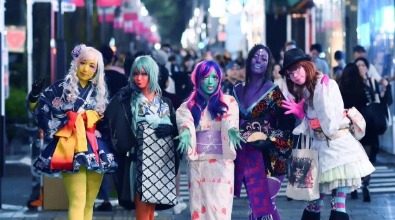Is Japan the Most Libertarian Place in the World?
Friday, September 21, 2018
[Op-Ed] An uncommon view of the archipelago of the rising sun

So how did I come up with the cockamamie idea that Japanese society is actually libertarian?
I imagine some readers are already scratching their head in confusion at the premise; it’s no secret that Japan from the onset is a place of societal rules and regulatory order. So how did I come up with the cockamamie idea that Japanese society is actually libertarian? Humor me for a second while I justify my hypothesis.
Libertarianism painted with broad strokes can be divided into two categories, the role of the state and liberties of the individual. Granted, the former can have a profound impact on the latter, but for the purposes of this argument I will espouse only two points about the role of government in Japan:
1. Public services work. Efficiency is the name of the game in Japan, and hiccups in the system are the anomaly. If the gas company is doing construction that blocks your garage, they offer you an alternative parking space; if a dangerous wasp species builds a hive outside your front door, the local government will handle the extermination; and of course if your train is even a minute late the train company apologizes profusely for the inconvenience.

2. The shenanigans of Japanese politicians doesn’t affect people’s lives. Before Abe’s 6 year reign as Prime Minister, most people on the street couldn’t name the leader of their country, because, in essence, the person in charge didn’t matter. Of course, heckling atone’s TV while watching the political circus unfold is as much a national pastime in Japan as it is anywhere else, but the Prime Minister musical chairs that has been characteristic of Japan’s governance for more that 50 years has little to no impact on the average person’s life, primarily because of point 1 above, the system works.
Setting aside the role of the State, my premise is based on the individual. Libertarianism is primarily concerned with an individual’s ability to live their life exercising basic rights and freedoms. However, these basic rights are afforded to individuals as long as one’s actions do not infringe upon the rights of others. And this is where Japanese society is incredibly successful.
In Okayama City earlier this year, a bus company’s employees went on strike demanding better job security. They striked by driving their normal routes (on time) but refusing to accept passenger fares. In essence, they exercised their right to strike without encroaching on the commuters’ right to go about their day usual.
Meiwaku (causing annoyance or inconvenience) is the best word in the Japanese language to outline a very basic point: don’t be an asshole. Unlike right-wing libertarianism that has a first-come-first-serve attitude to shared resources, left-wing libertarianism has an egalitarian approach to public goods. In this sense, the thought process is not “how do I make the world adjust to me,” but rather, “how are my actions affecting the world around me?” The beauty of this attitude is that whatever is in people’s hearts and minds is irrelevant because in a public sphere everyone has the right to co-exist peacefully. That’s why despite the 1 million commuters that pass through Shinjuku Station (the world’s busiest station) everyday, you can still drop your wallet and find it in the lost and found. Respecting someone else’s right to their own property – can’t get more libertarian than that.

Consider the most controversial topic in all history: religion. Although the Japanese archipelago is dotted with shrines and temples from north to south and many Japanese traditions have religious roots, religion is not a topic that comes up, pretty much ever. Your religion, your right, your business. Morality isn’t defined by religiosity in Japan nor does religiosity assume morality – an attitude that can be considered most fair in a time when scandals within religious institutions are rampant worldwide. One can have a relationship with a higher power if they choose, or not, but it doesn’t have to justified it to anyone. Simple.
Another hot topic issue that is plaguing societies in Europe and North America is the tumultuous issue of abortion. Abortion has been legal in Japan since 1948 (it was was one of the first countries in the world to legalise abortion), and Japanese society has completely moved passed the topic.It’s not just a non-issue, it is a fact, and a right that some people may choose to exercise. And fantastically, since the 20th century, it remains with minimal stigma.
I chose contentious examples like religion and abortion to emphasize my conviction that in many ways Japanese society is in fact exceptionally libertarian. Because no one can deny that while the rest of the world continues to squabble over these issues, Japan has moved passed them, and has evolved into a society where no one will look twice at you for drinking a beer at nine am just because you feel like it and if you're into alternative lifestyles and want to dress in clothing inspired by Victorian and Edwardian children’s wear á la Lolita, you’re not “weird,” you just are. Live and let live, as they say.

Of course I am fully aware that Japanese society isn’t without of it’s own flaws and can be behind the times in different ways, but what needs to be acknowledged and cherished about Japanese society today is that it doesn’t come with the same historical baggage you find in most other places in the world. The collective spirit of the country that is risen and fallen over again together has spawned an climate of good-will amongst people rather than distrust. Still today in Japan business can be conducted on a trust and a handshake (well, a bow actually) and 6-year-olds can ride the train to school by themselves.
Japan is an easy place to live not just because public services are reliable, but more because Japanese manners have unknowingly created a libertarian atmosphere where everyone agrees that their rights end where another’s begins. As a result people can go through their day without worry, and to me, that is not only libertarian, but also the greatest luxury there is.
About the Author

I've been in Japan so long that I say my heart is Japanese. And still this country impresses me from time to time. In those moments I think, "That's why I love living in Japan."








